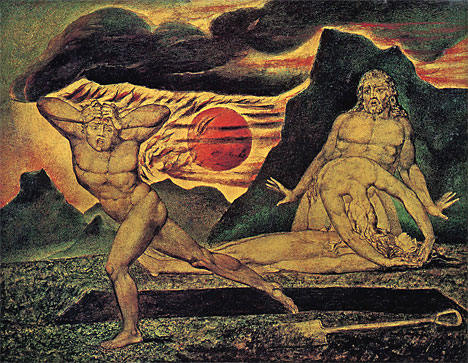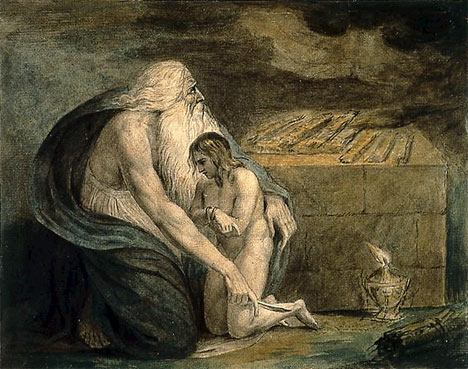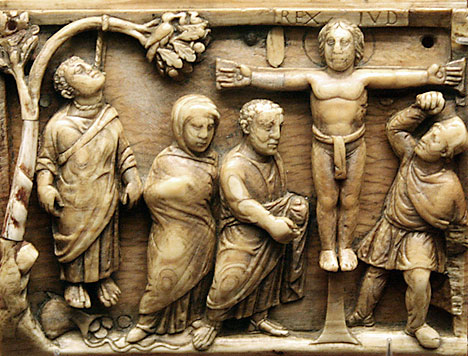Mar
16
2012
 Douglas Wilson writes:
Douglas Wilson writes:
“What is the meaning of ”one is taken and the other left’? This is commonly thought to refer to the rapture — one taken up into heaven, and the other left on earth to kick himself for not praying the sinner’s prayer when he had a chance. On the bright side, there will be a lot of free, unmanned cars available” (Heaven Misplaced, p. 104).
Matthew 24 is a prediction of the Covenant curses falling upon Judah for the last time. One being taken and the other left has to do with displacement. Titus enslaved the best Jews and took them in ships to Egypt.
“And the Lord will take you back to Egypt in ships, by the way of which I said to you, ‘You shall never see it again.’ And there you shall be offered for sale to your enemies as male and female slaves, but no one will buy you.” (Deuteronomy 28:68)
It’s one thing to get the historical fulfilment correct, but there’s a whole lot more going on here. In His speech, as the fulfilment of Israel, Jesus is working through the Bible Matrix, a combination of the Creation week, the weekly and annual Feasts, and the process of Dominion. This means that He is using examples of all the previous historical Covenant structures to make His point. The Covenant cycle has snowballed through history and picked up a lot of events on its way.
Continue reading
1 comment | tags: Abel, Atonement, Cain, Covenant Theology, Deuteronomy, Doug Wilson, Esau, Feasts, Genesis, Jacob, Lamech, Literary Structure, Matthew, Systematic typology | posted in Against Hyperpreterism, Bible Matrix, Biblical Theology, The Last Days
Mar
5
2012

“…and they saw the God of Israel. And there was under His feet as it were a paved work of sapphire stone, and it was like the very heavens in its clarity. But on the nobles of the children of Israel He did not lay His hand.” (Exodus 24:10-11)
Well, I’ve been blustering on about art and “intuition” in generalities for about a week now. Fluffy generalities are exactly the kind of thing that annoys me about many Biblical scholars, and I reckon it annoys God, too. They never seem to get down to specifics, and He is very specific. This shows in His architecture, and also in His literary architecture. So, here, in a section of Matthew 14, is a chance for me to get specific and show you what is possible with this “killer hermeneutic.” [1]
After a brief look at the structure of this passage the other day, I thought I’d spend some more time on it. A closer analysis has revealed an even greater beauty than I expected. (I have briefly referenced the order of words in the Greek to avoid any great missteps, so it may not be perfect, but it’s close.) Much learning hath indeed made me mad but I hope you’ll take a few minutes to see this passage through my eyes.
Continue reading
Comments Off | tags: Atonement, Booths, Covenant curse, Covenant Theology, Feasts, High Priest, Laver, Literary Structure, Matthew, Moses, Tabernacle, Ten Commandments | posted in Against Hyperpreterism, Bible Matrix, Biblical Theology, The Last Days
Feb
6
2012
or Ethnic Cleansing as Mercy

“In representative terms, the people of God are no longer the Land but the heavenly Sea. The Church herself is the oncoming storm.”
In The Days of Vengeance [PDF], David Chilton did a great job of introducing many of us to the fact of Jesus’ use of “cosmic language” in Matthew 24 to describe the end of the Old Covenant. Not only is the idea of an actual, physical star falling to earth impossible (can you imagine the sun “falling to earth”?) but Jesus is quoting from a prophecy against Babylon. His audience would have realized this as a scathing attack against the Herods and their “government controlled” Temple worship. So, the language is clearly poetic, but why would the prophets—and Jesus and His apostles—deliberately cause so much confusion by using cosmic language to describe non-cosmic events? The answer is found in the mercy of God.
Continue reading
3 comments | tags: AD70, Baptism, Circumcision, Communion, Postmillennialism, Tabernacle, Temple | posted in Against Hyperpreterism, Bible Matrix, Biblical Theology, The Last Days
Nov
18
2011

In Deep Comedy, Peter Leithart compares the Bible’s essentially comic and hopeful view of history with the Greco-Roman view, which is essentially and irredeemably tragic.
In Paul’s estimation, anyone who thought that the new life through Jesus pertained to some realm outside this history was simply an unbeliever. For the gospel says otherwise.
Continue reading
1 comment | tags: Church Fathers, Church History, David, Ecclesiastes, Faith, Gnosticism, Job, Literary Structure, Peter Leithart, Postmillennialism, Solomon | posted in Against Hyperpreterism, Biblical Theology, Quotes
Nov
16
2011

Remy Wilkins recently proposed a thesis about serpents and dragons in the Bible. Is there a difference? Are the words interchangeable? And even if they aren’t, how are these animals–and the spiritual truths they were created to represent–related?
This post has been slain and resurrected for inclusion in my 2015 book of essays, Inquietude.
Continue reading
1 comment | tags: Dominion Theology, Genesis, Noah, Remy Wilkins, Revelation 20, Satan, Totus Christus, Totus Diabolus | posted in Against Hyperpreterism, Biblical Theology, Creation, Quotes, The Last Days
Nov
11
2011

“In Genesis 1, God creates the world in six days, through certain steps. Then He creates human beings out of ‘world,’ and human beings made out of world are going to live like ‘world’ does. They are going to go from darkness to light, formlessness to form; they are going to marry and take dominion. They are going to become like lights ruling over the earth. They’re going to live in 24 hour cycles. They will undergo times when God pulls them apart and puts them back together in new ways–all because they are made out of world. And these are all steps of glorification.” — James B. Jordan (The Bible You Never Read)
Some Christians assert that Adam was not the first man, only the first man in Covenant with God. [1] This means that the judgments upon such a Covenant could only be social, not “Creational.” They could only fall upon those under Covenant, not the “pre-Adamic” people from which this Covenant separated Adam. This assertion must be made to support the view that the Great Flood was only a local event, destroying only the “Adamites,” not all people on the planet. Does this assertion have any support in Scripture? Apparently yes, but factually no.
Continue reading
2 comments | tags: Abraham, Covenant Creationism, Covenant Theology, Flood, Gnosticism, James Jordan, Noah | posted in Against Hyperpreterism, Biblical Theology, Creation, Quotes, The Last Days
Nov
9
2011

Micah Martin (brother of one of the authors of Beyond Creation Science), has kindly read Bible Matrix II and written about my adherence to the Genesis account of Creation as both Covenant and history (i.e. the account is not simply an account of the physical world being given a Covenantal purpose as a Temple, but also its actual Creation). There is much that we agree on, but the disagreement on this subject couldn’t be sharper, or of more importance.
Continue reading
2 comments | tags: Abraham, AD70, Against Hyperpreterism, Babylon, Covenant Creationism, Dispensationalism, Flood, Noah | posted in Against Hyperpreterism, Bible Matrix, Biblical Theology, Creation, Quotes, The Last Days
Nov
7
2011
or A Dream Within the Dream

One of the hyperpreterist/full preterist [1] gents made a keen observation after reading my article Covenant is the Key: Moses vs. Hyperpreterism. My argument was that since the Revelation follows the Covenant structure laid down in the Torah (and echoed throughout the Bible), we should expect the final section of the book to concern the future, otherwise known as Continuity or Succession.
The counterargument was that this section did concern the future when John wrote the book, but that we are living beyond that future now, and there is no final event or consummation. The only consummation was AD70.
This is a really good argument, but it does two things. Firstly, it makes nonsense of their own argument that Revelation 20 is another viewpoint of the events surrounding the end of Judaism in AD70. Also, it fails to take into account the structure and contents of Revelation 20 itself.
Continue reading
3 comments | tags: Against Hyperpreterism, Covenant Theology, Feasts, Literary Structure, Millennium, Postmillennialism, Revelation, Revelation 20 | posted in Against Hyperpreterism, Bible Matrix, Biblical Theology, Ethics, The Last Days, The Restoration Era
Oct
26
2011

“What purpose then does the law serve? It was added because of transgressions, till the Seed should come to whom the promise was made; and it was appointed through angels by the hand of a mediator.” Galatians 3:19
Was the Law just a stop-gap measure to hold things together until Jesus was born? Was the Mosaic Covenant just a “parenthesis” between the “graceful” Covenant with Abram and the “graceful” New Covenant?
Continue reading
3 comments | tags: Abraham, Covenant Theology, Resurrection | posted in Against Hyperpreterism, Bible Matrix, Biblical Theology, The Last Days
Jul
14
2011

“…falling headlong, he burst open in the middle…”
Todd Robinson commented:
“I’ve enjoyed your particular brand of orthodox preterism. Working through Acts recently, I began to wonder what Michael Bull’s take on Acts 1:11 and 3:19-21 would be… Thanks for any insight.”
Continue reading
2 comments | tags: Abraham, Acts, AD70, Ascension, Atonement, Herod, Judas, Pentecost, Peter, Peter Leithart, Preterism, Urim and Thummim | posted in Against Hyperpreterism, Bible Matrix, Biblical Theology, The Last Days, The Restoration Era



































